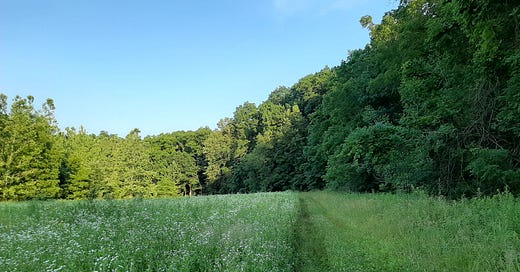I grew up in the country, but never dug in the ground. I didn’t bother after that one time when Mrs. Drake, our white-haired neighbor who knew American Sign Language and taught me Scrabble, encouraged my interest in gardening. I wanted to grow carrots so she gave me seeds.
But Upstate New York is not a land of roots. It’s a land of rocks. Much like my family. I dug out the first layer of rocks with a pick axe and planted the seeds. I didn’t dare dig farther to see what was buried deeper. That was my downfall. From the shape of the carrots, it was more rocks. I should’ve known.
But 50 years later, here, on this land in Iowa, I’m surrounded by roots. Prairie roots, tree roots and bromegrass roots whose white tendrils can reach more than two feet underground to encircle unsuspecting transplants.
Some roots run just barely under the surface. Others, like taproots, can burrow more than 10 feet, prairie grass 17. Tight, skinny bluegrass roots and thick, fat corms and every kind of root in between live together in this land. I’ve learned that tree roots are not good holders of soil. If I had only looked, I would’ve seen – as I do now – that when a tree falls into the river it takes the bank with it. For years before that fall, sun, soil and rodents take advantage of the architecture of those massive roots, widening the doorframes and tunnels until all it takes is a little shove from a good wind to drop the giant. On the other hand, grasses, those tiny, tenacious stranglers, never let go of a river bank without a fight.
Rhizomatic roots are the most dangerous, because they reach and plant, reach and plant, replicating themselves forever. That’s why grassroots movements are so dangerous. There is no head, there is no taproot, there are just thousands and thousands of connected lives all demanding the same sunlight, the same soil, the same rain as the powerful trees that try to shade them out, as the autumn olive or gray dogwood that want to hoard all the resources, as the foolhardy gardens planted by humans, as if a young tomato vine can even raise a fist against tenth generation Creeping Charlie without a whole lot of human intervention.
Gloves are too soft and no protection from real root work. Roots have torn my gloves and bare hands open with wide cuts and tiny ones, worn the tips of my fingers to an itchy dryness and sometimes landed me on my ass pulling on them with all my weight. My shoulders will ache for days after doing battle with sod I want to turn into, well, anything else, yet it will be sod again someday, rest assured. For young plantings in the orchards, I sometimes resort to the nuclear option – chemicals – because thousands of hours and tons of mulch later, I’ve learned to respect the lengths some roots will go to rid themselves of competition.
I envy them sometimes, these roots that know their strength. Nothing stops them. No self-doubt, no criticism, no sense of yesterday or tomorrow, or life or death or meaning slow them from collecting the nutrients they need to feed their plants. From the centuries buffalo trampled them to the decades heavy tractors pissed diesel fuel, glyphosate and anhydrous on them, to more recently when I beat them back with mulch or poison, they’ve always bided their time until the pressure let up, conserving their energy until the opposition exhausted itself. I wish I had that quiet, infinite strength. I’m glad they do.
Roots give me an odd sense of hope in an otherwise hopeless world. They are the plant version of cockroaches. They are a menace to those who seek more than their fair share. They demand an equilibrium only they understand. And when we humans are done wrecking this place, I’m sure they will survive, even thrive, under a new set of rules that will define a new world.
Special thanks to the Iowa Farmers Union, a progressive grassroots organization that amplifies the voices of Independent Family Farmers, now hosting a Writing Cooperative. Learn more and join as a farmer or friend of farmer at iowafarmersunion.org.
SAVE THE DATE! You’re invited to the Iowa Farmers Union Day at Draco Hill Nature Farm Friday, Oct. 4th. Sign up for free events all year long at dracohill.org/events.






Suzan, your metaphor is fantastic! Thank you for putting to words the way I feel most days. Grassroots organizing has the potential to hold back that deadly force of unfettered capitalism. It’s ruining Iowa and a good share of our rural communities.
A fantastic piece -- thank you!!